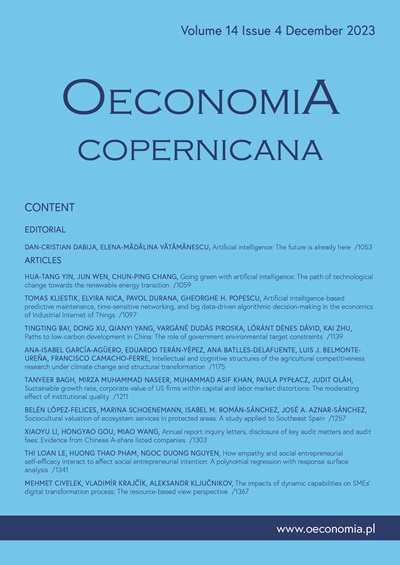Credit cycles and macroprudential policies in emerging market economies
IF 10.8
1区 经济学
Q1 ECONOMICS
引用次数: 2
Abstract
Research background: Excessive credit expansions have an important role in the generation and amplification of business cycles in emerging market (EM) economies. Macroprudential policies can be beneficial in restraining excessive credit growth and safeguarding financial stability. Despite recent theoretical advances in understanding of the benefits of macroprudential policies, empirical evidence on their effect on the credit cycle is still scarce. Purpose of the article: This paper studies the effectiveness of macroprudential measures in the sample of major EM economies focusing on the broad credit measure and using an empirical framework which aims to alleviate several concerns in the previous literature. We examine the effectiveness of four categories of measures which are granular enough to provide relevant policy perspectives, whilst mitigating data sparsity issues. By exploiting both time-series and cross-country variation in the tightness of macroprudential regulation in the construction of policy variables we also mitigate some of the common reverse causality concerns. Methods: We use panel data and employ several (fixed effect, bias corrected LSDV and dynamic interactive fixed effect) estimators to ensure that the results are not sensitive with respect to the estimation method while, together with our construction of the policy variables, alleviating other endogeneity concerns. Findings & value added: We uncover the heterogeneity in the effects of macroprudential measures on the credit cycle. While measures related to bank capital and credit activity are found to be effective in leaning-against the credit cycle, the measures targeting bank liquidity and FX exposures fail to have statistically significant effect. Our results provide the rationale for mixed evidence in the empirical literature studying the effectiveness of the broadly defined macroprudential measures. From the policy perspective, our findings provide evidence that the measures which address excessive credit expansion and strengthen the resilience of the financial system are effective in the EM economies.新兴市场经济体的信贷周期与宏观审慎政策
研究背景:过度的信贷扩张在新兴市场经济体商业周期的产生和放大中发挥着重要作用。宏观审慎政策有利于抑制信贷过度增长和维护金融稳定。尽管最近在理解宏观审慎政策的好处方面取得了理论进展,但关于其对信贷周期影响的实证证据仍然很少。本文的目的:本文研究了主要新兴市场经济体样本中宏观审慎措施的有效性,重点是广义信贷措施,并使用了一个实证框架,旨在缓解先前文献中的一些担忧。我们研究了四类措施的有效性,这些措施足够精细,可以提供相关的政策视角,同时缓解数据稀疏性问题。通过在政策变量的构建中利用宏观审慎监管紧密性的时间序列和跨国变化,我们也减轻了一些常见的反向因果关系问题。方法:我们使用面板数据,并使用几种(固定效应、偏差校正的LSDV和动态交互固定效应)估计量,以确保结果对估计方法不敏感,同时结合我们对政策变量的构建,缓解其他内生性问题。研究结果和附加值:我们揭示了宏观审慎措施对信贷周期影响的异质性。虽然与银行资本和信贷活动相关的措施被发现在倾向于信贷周期方面是有效的,但针对银行流动性和外汇敞口的措施在统计上没有显著效果。我们的研究结果为研究广义宏观审慎措施有效性的实证文献中的混合证据提供了理论依据。从政策角度来看,我们的研究结果证明,解决过度信贷扩张和加强金融系统弹性的措施在新兴市场经济体是有效的。
本文章由计算机程序翻译,如有差异,请以英文原文为准。
求助全文
约1分钟内获得全文
求助全文
来源期刊

Oeconomia Copernicana
ECONOMICS-
CiteScore
13.70
自引率
5.90%
发文量
26
审稿时长
24 weeks
期刊介绍:
The Oeconomia Copernicana is an academic quarterly journal aimed at academicians, economic policymakers, and students studying finance, accounting, management, and economics. It publishes academic articles on contemporary issues in economics, finance, banking, accounting, and management from various research perspectives. The journal's mission is to publish advanced theoretical and empirical research that contributes to the development of these disciplines and has practical relevance. The journal encourages the use of various research methods, including falsification of conventional understanding, theory building through inductive or qualitative research, first empirical testing of theories, meta-analysis with theoretical implications, constructive replication, and a combination of qualitative, quantitative, field, laboratory, and meta-analytic approaches. While the journal prioritizes comprehensive manuscripts that include methodological-based theoretical and empirical research with implications for policymaking, it also welcomes submissions focused solely on theory or methodology.
 求助内容:
求助内容: 应助结果提醒方式:
应助结果提醒方式:


